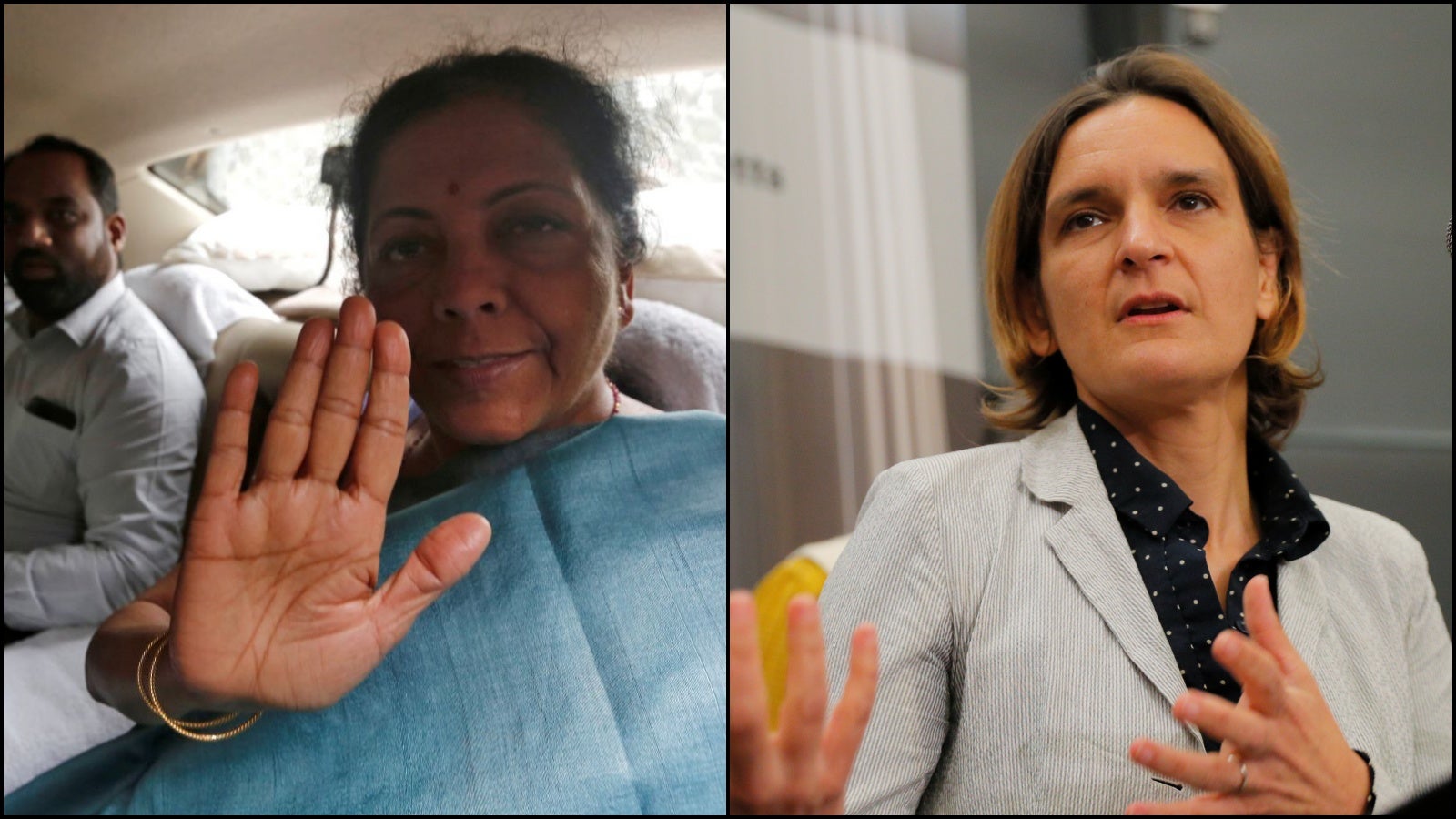Nirmala Sitharaman and Nobel laureate Esther Duflo have one thing in common
This week, two high-profile women who don’t know each other—in fact, one is a critic of the other—discovered they have something in common: casual sexism.


This week, two high-profile women who don’t know each other—in fact, one is a critic of the other—discovered they have something in common: casual sexism.
Nirmala Sitharaman, India’s first full-time female finance minister, and Esther Duflo, the second woman to win the Nobel Prize for Economics, found out on the same day (Oct. 14) that who they are married to will define public commentary on them more than their achievements or failures.
Every woman can relate to this: the sheer reluctance in our society to ever view women as being independent of a man. If you are ambitious, opinionated, controversial—essentially, your own person—the media, your detractors, sometimes even friends, will pull out a male connection from your past or present to juxtapose you with or benchmark you against.
Sitharaman’s encounter with this entrenched misogyny began with an opinion column in a leading newspaper that tore apart her ministry’s grasp of the economic slowdown. Indeed, the economy is one giant chink in the Narendra Modi government’s armour.
Growth rates have slowed down, credit flow to the commercial sector is down by 88% and several industrialists are contemplating moving their money abroad. The criticism of the government for mishandling the economy was hardly surprising. But the column attracted wide attention because it was written by Sitharaman’s husband, Parakala Prabhakar.
There was much immediate gloating by those who dislike the Modi government, political opponents and liberal pundits alike. The excited, if whispered, subtext was evident—if Sitharaman can’t even convince her own husband, how can she convince the people of India.
There are many reasons to disagree with the finance minister and the government at large. But what her husband thinks is not one of them.
Astoundingly, when I called out this sexism and demanded that Sitharaman be evaluated and judged purely on the basis of her own performance, I received a deluge of messages informing me that her spouse, Prabhakar, was “a well-respected economist in his own right.”
I have no quarrel with that. But Sitharaman too is a person in her own right. And that’s something many Indians seem to have trouble accepting when it comes to women.
And Duflo, the 46-year-old economist and the youngest recipient of the world’s most coveted prize, was described in multiple headlines as “the wife of Abhijit Banerjee”—the Indian-origin co-winner.
Duflo, who has spent a lifetime researching the roots of poverty, reminded the world that women in the profession deserve to be treated with more respect. As the only living woman with a Nobel Prize in economics, she called the problem “structural and fundamental”. In an interview to the Nobel Prize website, she said:
“there are not enough women in the economics profession. Period. The problem is at all levels. Not enough women go into Economics as graduate students, not enough women continue to become assistant professors that get promoted …I think the profession is starting to realise the general climate and the way we treat each other is not conducive for having more women in the profession.”
But even on the biggest day of her career, Duflo’s marriage to Banerjee—entirely incidental and even irrelevant in this context—became the media marker to describe her.
The responses to both Sitharaman and Duflo give away society’s subliminal, but essential discomfort with female achievers. It also says something about how we view marriage and a woman’s place in it.
Actually, women get a raw deal either way. If you are unmarried and in the public eye, your sexuality and morality will constantly be deconstructed. Note how troll attacks on independent-spirited women are highly sexualised in their abuse. In this failure to meet the social norm, unmarried women are either deemed highly promiscuous or dismissed as frustrated, because they aren’t getting enough sex. These words may not make it into mainstream media commentary but are regularly used in drawing room gossip and in social media remarks.
And if you are married, how can you not be subsumed within that institution, to first be someone’s wife and then anything else! That a man and woman who are married can have different ideologies and opinions, and that the woman can actually build a career contrarian to the views of her husband is still unimaginable to most people in India.
When Sitharaman’s husband’s column went viral, another set of whispers suggested that perhaps the couple was estranged. Once again, it is entirely irrelevant, no one’s business and just a salacious instrument to pull successful women down.
To defend Sitharaman against this onslaught is not the same as agreeing with all her policies. Nor does it make us friends. I know Sitharaman professionally as a journalist and have often had arguments and disagreements with her. But not once has it been relevant, in any of those disagreeable moments, who her husband is or what the state of her marriage is. Nor should this be a question surrounding any woman—Duflo, Sitharaman, you or me.
In any case, when it comes to numbers, finance and economics, there are unspoken prejudices that women are still battling. And usually this expresses itself as patronising mansplaining. For instance, repeated suggestions to Sitharaman to “smile more often.” No one would ever say that of a male politician. And again, if Sitharaman did smile—or even better, if she laughed and guffawed her guts out when she felt like it—she would be told, as Hillary Clinton was, that she is “too loud,” “too hysterical” or some such.
Women can and do fight the glaring examples of inequality. It’s getting folks to be consciously unbiased that is the longer war.
Barkha Dutt is a Delhi-based TV journalist and anchor with more than two decades of reporting experience.
We welcome your comments at [email protected].